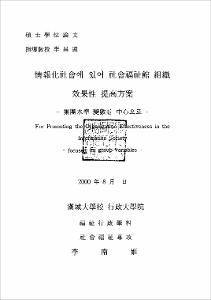정보화사회에 있어 사회복지관 조직 효과성 제고방안
- Files in This Item:
-
-
Download
 000000066070.pdf
기타 데이터 / 3.2 MB / Adobe PDF
000000066070.pdf
기타 데이터 / 3.2 MB / Adobe PDF
-
Items in Repository are protected by copyright, with all rights reserved, unless otherwise indicated.
 000000066070.pdf
기타 데이터 / 3.2 MB / Adobe PDF
000000066070.pdf
기타 데이터 / 3.2 MB / Adobe PDFItems in Repository are protected by copyright, with all rights reserved, unless otherwise indicated.